Help! My Puppy is Chewing Up My House!
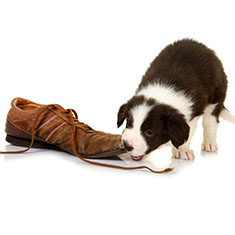
The first step to stopping any behavior is to understand why the behavior is taking place. Puppies chew for three main reasons: they are teething, they are bored, and they don’t know any better. If you have raised any type of baby creature (no matter whether they had four legs or two), you know that it is very painful to bring in new teeth, and that bringing in new teeth is a required process of development.
One of the best ways to soothe the pain is to chew on something to help the new tooth work its way through the gum tissue. For our human children, we often use teething rings that have been stuck into the freezer for a time to chill the painful, inflamed gums. For our dogs, the same philosophy applies. A wet frozen rag can make a great teether for your puppy. As the ice on the rag melts, however, it can make a wet mess, so this activity is best reserved for outdoors or on a linoleum floor that can be easily dried.
To combat boredom-based chewing, you must provide your dog with other ways to engage his brain. If you have a working breed, get your puppy involved in the types of activities for which he or she was bred. For example, if you have a herder, give him something to corral so he feels useful. All dogs appreciate and need the challenge presented by basic obedience training.
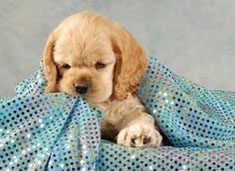
Spend time with your dog at the park, on the beach, or even with frequent grooming so he doesn’t have time to become bored. Remember that a dog generally sleeps up to 20 hours a day, so if you can keep him or her occupied for the other four hours, you can keep the dog from ever becoming bored.
Some toys, such as those made by Aspen Pet Products, or by Kong (available from Best Friends General Store) are made so that you can hide treats inside. They challenge your dog to use his or her brain to release the treat, providing the mental stimulation they crave.
The last consideration for chewing is that your puppy simply doesn’t know any better. Teach the puppy what you think is appropriate for chewing by replacing whatever he or she grabs with a designated chew toy. Say “No!” sharply when you take away your tennis shoes or your daughter’s stuffed toy. When you hand the dog a bone or a chew toy, praise her lavishly if she takes it in her mouth.
Spend a few minutes playing with the dog using the toy – your personal attention is about the best gift for any dog. Keep appropriate chew toys scattered around any area in your house where your puppy might go so you always have something to trade for when the dog grabs something she shouldn’t have.
No matter why your puppy chews, you must remember that your number one job is to keep your dog safe. If you will not be with your new puppy, you must crate him or her to keep the dog from chewing things like electric cords, plants, or cleaning chemical bottles that could cause irreversible harm to the puppy’s developing body.
Check out these articles from the Doggies Dog Den to learn more about shaping your dog’s behavior and puppy-proofing your home.
Doggies Den: Latest Articles
 Homemade Thanksgiving Treats for Your Dog
Homemade Thanksgiving Treats for Your Dog
NUTRITION We all want to include our dogs in our holiday celebrations, but hopefully, you're aware that sharing table scraps with your dog isn't always the best idea.
 Keeping Your Dog Safe during the Summer Months
Keeping Your Dog Safe during the Summer Months
HEALTH Summer is coming on fast, so it’s time to plan how you will keep your dog safe and healthy through the lazy, carefree, warm days.
 Vaccination Time Again-Keeping Your Puppy Healthy
Vaccination Time Again-Keeping Your Puppy Healthy
DOG HEALTH So you have your new puppy picked out. There are quite a few shots, treatments and examinations that will keep the newest member of your family healthy.
 Canine Thanksgiving Feast
Canine Thanksgiving Feast
NUTRITION With the wide variety of food at Thanksgiving dinner, chances are you'll want to give your dog something special, too. If you're contemplating what to feed your dog for the holiday, here is a guide to a great Canine Thanksgiving Feast.
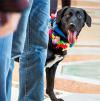 Dog Walking Tips Every Owner Should Know
Dog Walking Tips Every Owner Should Know
DOG FUN Walking your dog is not only crucial to keeping him healthy and happy, it strengthens the bond between your canine friend and his caregiver. There are a lot of obstacles out there. Don’t forget these simple tips to keep your walk fun and safe in the outside world.
 The Benefits of Physiotherapy for your Dog
The Benefits of Physiotherapy for your Dog
HEALTH The same techniques that physiotherapists use to treat a variety of injuries and conditions in humans have been adapted to suit animals with great success. Family pets, show dogs, and working dogs can all benefit greatly from physiotherapy. Dogs whose activities involve a lot of agility are especially susceptible to the types of problems that physiotherapy can address.
 The Decision- Adding a Dog to Your Family
The Decision- Adding a Dog to Your Family
FIRST TIME OWNERSBringing a dog into your family is a decision where many people don’t realize it’s magnitude until after they have the dog. There are a number of things that you need to research before you decide to purchase a dog, and it starts right in your own home.
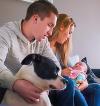 Bringing Your Dog Into Your New Baby's Life
Bringing Your Dog Into Your New Baby's Life
HEALTH Many believe that a dog and a new baby cannot happily coexist, so therefore the dog has to go. This is not necessarily the case.  A new baby does not mean you have to abandon your dog.

Doggies Den:
Most Popular Articles
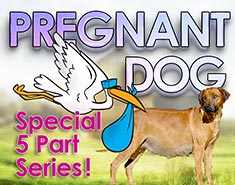
Dog Pregnancy Symptoms
HEALTHIf you suspect your dog might be pregnant, check out part one in this series on pregnant dogs, where we cover pregnant dog symptoms.
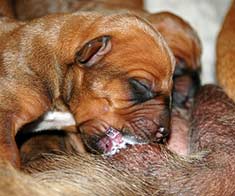
Dog Birth
HEALTHIn the third article of our dog pregnancy series, we look at the wonderful, but messy, process of bringing newborn puppies into the world.
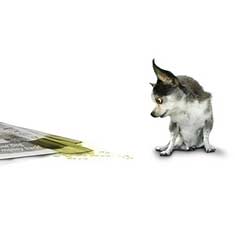
Indoor Dog Potties
DOG PRODUCTSIt's been a long day at work. You were so busy, you didn't even take time to eat a sandwich, let alone run home to let your dog out. You're on your way home, knowing the poor dog is crossing his or her legs by now, when your car breaks down, delaying you even further. Can't somebody make this easier?
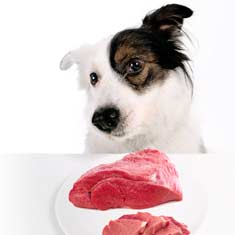
Your Dog’s Digestive System
PHYSIOLOGYEver wonder why your dog eats so fast? Or why he eats gross things? Or why he gets sick to his stomach? Or why his waste stinks so bad? Some of these things are normal, some are not.

Canine Respiratory System
BREATHINGThe basic function of your dog's respiratory system is to bring oxygen in to and remove carbon dioxide from the body. Knowing the symptoms of respiratory diseases can help you help your stay healthy.
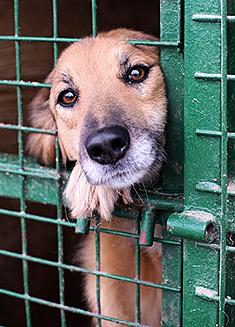
Shelter Dog Adoption Tips for Success
ADOPTION Are you intimidated by the prospect of "rescuing" a dog from a shelter? One reason that you may be wary of adopting a dog from a shelter is not knowing how to choose. Adopting a dog from a shelter can be a rewarding process, if you're prepared to do a reasonable amount of research.
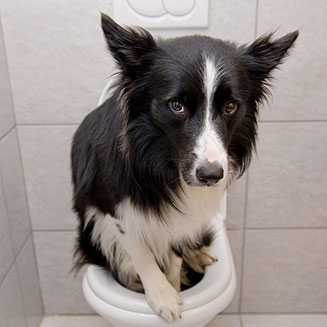
Canine Urinary Tract Infections
SYMPTOMS AND TREATMENTDoes your dog seem to be having trouble relieving his or her bladder? Learn how to recognize the signs of urinary tract infections and how to treat them before they spread.
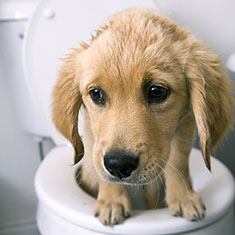
What to do for Dog Diarrhea
SYMPTOMS AND REMEDIESIf you have dogs in your house for any length of time, you have likely experienced at least one bout of dog diarrhea. Beyond the pain in the tuckus involved in cleaning up the mess, you should know what causes diarrhea, and when it's important to see the vet.
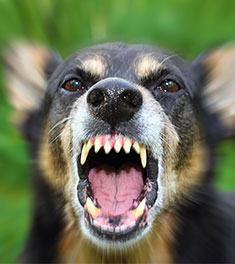
What to do for a Dog Bite
DOG BEHAVIOR Getting bitten by a dog can be scary, and you may be tempted to run around in circles for a while, trying to figure out what to do. Here's our guide to help you manage the situation.
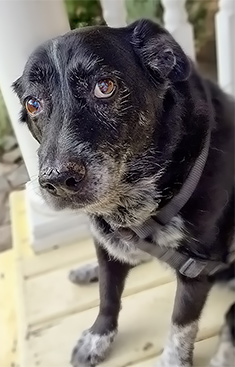
Top Ten Tips for Living with a Senior Dog
DOG HEALTH Bringing home a new puppy is so exciting, but it doesn’t take all that long for your exuberant puppy to grow into a senior dog who may have special needs. Here are the doggies.com top ten tips for taking care of your companion who has been with you through so much.
